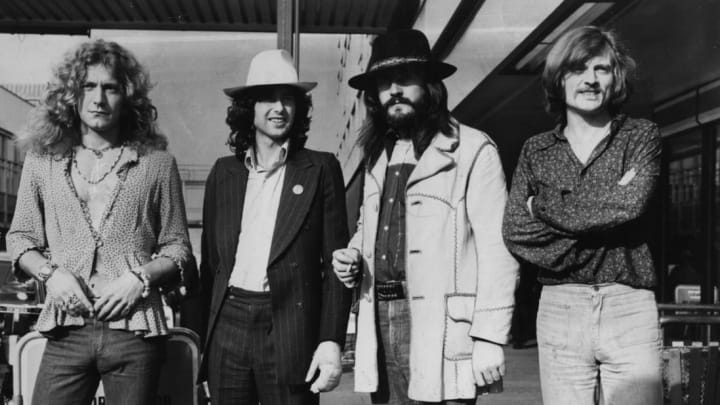By 1972, Led Zeppelin were unstoppable. The previous November, they had released their mammoth Led Zeppelin IV, which features the spiraling FM radio staple “Stairway to Heaven.” The album shot up to number one on the U.K. charts the second week after its release. The band could put a pin in any place on a world map and play the largest concert venue there, leaving empty whiskey bottles and wrecked hotel rooms in their wake. In his biography When Giants Walked the Earth, rock journalist Mick Wall wrote that, at the time, the British quartet were “[s]elf-made millionaires so famous they now hid behind armed guards, employed their own drug dealers and flew by private jet.”
There was just one thing they couldn’t do: Enter Singapore.
The band was scheduled to play an outdoor show in Singapore on February 14, but officials at the airport refused them entry. “Not only were Led Zeppelin not allowed into the country, they were even refused permission to get off their plane and had to fly back to London,” Stephen Davis wrote in his book Hammer of the Gods: The Led Zeppelin Saga.
The reason wasn’t their reputation for debauchery, the supposed satanic messages in their songs, or some local distaste for drum solos: It was the long hair sported by all four band members.
As youth-led, anti-authoritarian cultural revolutions swept the world, Singapore had hoped to immune itself with a campaign against outward signs of rebellion and Western “drug culture,” like long hair on men. Male visitors were turned away or hassled for their locks. A month before Led Zeppelin touched down, an Australian visitor told the Associated Press he had been given two days to get a haircut or leave.
One of Singapore’s top priorities after independence was shaping the young generation to suit the country’s interests. “Education was seen as the most important long-term means to inoculate national values and train the work-force for maximum economic productivity,” C.M. Turnbull wrote in A History of Singapore: 1819 – 1988. After its 1965 independence, “the education system was adapted to mold a nation.” The country spent one-third of its budget on education.
Nonetheless, officials apparently didn't think they could risk the corruptive influence of long-hair types. English rock pioneer Cliff Richard was also turned away in 1972 for collar-length hair, and Japanese new-age musician Kitarō cancelled a sold-out show in 1984 because officials objected to his flowing follicles.
Singapore has mellowed out since. In 2013, former Zeppelin front man Robert Plant, still sporting quite a mane, made it past the airport gates to play his first gig there.
